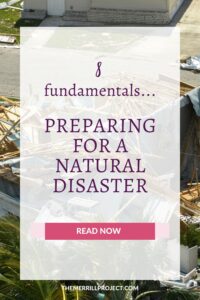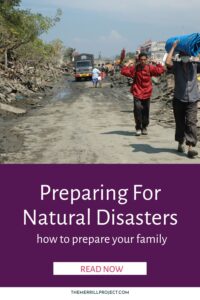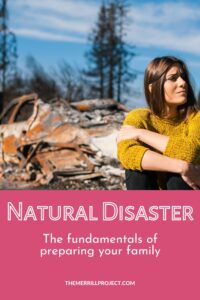Natural disasters can be unpredictable and devastating. And it’s impossible to overstate the importance of having a plan in place if they occur. To ensure your family is ready for anything, here is some essential information and advice on how to create an emergency plan, what should go in your natural disaster emergency kit, and more.

Download Your FREE Emergency Preparedness Resources HERE
This post contains affiliate links. Read my affiliate link disclosure here
8 Fundamentals Of Preparing For Natural Disasters
Create an Emergency Plan
The first and most critical step to take when preparing for a natural disaster is to develop a comprehensive emergency plan with your family. Habitat for Humanity recommends discussing where you will meet if you become separated, which communication methods you will use, and who will be responsible for which tasks. Regularly reviewing and practicing this plan will help everyone stay calm and coordinated during an actual emergency.
Getting Out
It’s important to designate someone outside the home as the point of contact; that way, everyone can stay updated on each other’s whereabouts. Moreover, the Insurance Information Institute suggests discussing evacuation routes from your home and
workplace. Practice these routes regularly, so every family member knows precisely what to do in an emergency.
Download Your FREE Emergency Preparedness Resources HERE
Emergency Kit Essentials
Every home needs an emergency kit that includes essential items you might need during a natural disaster. Include water (one gallon per person per day), nonperishable food items, a first-aid kit, flashlights, batteries, battery-powered radios, and any other items necessary for your kit. While you’re at it, include copies of essential documents like birth certificates
and passports in case they become damaged or lost during the disaster. It’s also wise to keep extra cash on hand since power outages could restrict your access to making electronic payments. Dive in deeper to building an emergency 72 hour kit here.
As a Business Owner

If you run a business from home, you’ll need to consider how to protect it if a natural disaster befalls your area. Start by identifying the potential risks. Hurricanes, earthquakes, floods, and fires each present a unique set of challenges that could limit or disrupt access to power, water, or other essential services. After identifying the hazards, create an evacuation plan and designate meeting points in case you need to quickly instruct your staff during an emergency.
Data and Technology
Consider how technology can streamline important processes for recovering from natural disasters — such as data backups and security protocols — so that all your essential information remains safe and secure no matter what happens. Utilize cloud storage solutions to ensure critical documents are accessible from anywhere, even if your physical location is compromised. It might be helpful to invest in alternative energy sources like generators or solar panels as insurance against power outages or blackouts caused by storms, floods, or other events.
Plan Ahead with a Home Warranty
It’s also a good idea when preparing for natural disasters to plan ahead by investing in a home warranty. Consider a service that provides peace of mind by safeguarding against unexpected and potentially costly repairs or replacements of essential home systems like HVAC and appliances. With a home warranty in place, you can budget for maintenance expenses more effectively, knowing that
many unexpected costs will be covered.
Stay Informed

It’s crucial to stay up-to-date on weather reports when living in an area prone to natural disasters. Doing so will allow you to adequately prepare yourself and your family for potential emergencies. Make sure all your family members can identify the warning signs of different types of disasters so that you can all act quickly if needed. Being informed about potential disasters will also give you peace of mind that you’re prepared for uncertainties.
In Conclusion…
Put a Plan in Place
Knowledge is power when preparing for natural disasters. By having an emergency plan and kit at the ready, your family will be equipped to stay safe during any unexpected events that may arise. Remember that having a reliable plan could mean the difference between life and death. Be sure to follow the tips above and continue learning how to create a safety
plan that’s tailored to the specific needs of your family and business!
Thank you to our guest writer Sharon Wagner for another fantastic informational piece.
If you liked this post, please let us know. Leave a comment below and click those share buttons to tell your friends. As always, we appreciate you taking a minute of your time to spread the word about preparedness.
